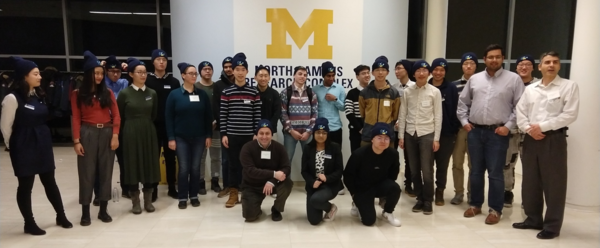SOCR News SOCR D43 2021 SummerSchool
Contents
[hide]SOCR News & Events: Data Science, Analytics, and AI in Health
Logistics
- Event: 2021 D43 Summer School
- Place/Time: June 21, 2021 (8 AM US ET, GMT-4)
- Meeting Logistics: Zoom call
- Presenter: Ivo Dinov
- Format: In 2021, due to the SARS-CoV-2 viral pandemic, the D43 Summer School will be virtual.
Outline
This presentation will showcase some of the recent SOCR lab developments in data science methods, artificial intelligence, and health analytics. Most of the details are provided below and additional tools, powerpoint slides, instructional resources, and learning modules are available on the SOCR Website.
Program
- General SoN Research: https://nursing.umich.edu/research
- Statistics Online Computational Resource (SOCR): https://www.socr.umich.edu/
- P20: Center for Complexity and Self-management of Chronic Disease (CSCD): https://socr.umich.edu/CSCD/
- Health Analytics Collaboratory (HAC): https://hac.nursing.umich.edu/
- SOCR Events: https://wiki.socr.umich.edu/index.php/SOCR_News
- Data: https://wiki.socr.umich.edu/index.php/SOCR_Data
- Apps: https://socr.umich.edu/HTML5/
- Learning modules: https://dspa.predictive.space
Tools
DataSifter
A patented algorithm and a computational model that enables effective and secure sharing of aggregated sensitive data. The DataSifter promotes transdisciplinary studies of general health, comorbid conditions, and diseases. The technique enables new scientific discoveries without compromising confidentiality or personal information.
Compressive Big Data Analytics (CBDA)
A ensemble meta-algorithm for representation and analysis of high-dimensional multivariate data from multiple sources. CBDA enables scalable analysis of complex data that currently cannot be analyzed using classical methods.
Pressure Injury Prediction Modeling (PIPM)
Hospitalization-related pressure injuries (PIs) present significant patient suffering, increased medical costs, and co-morbidities.
The interactive PIPM webapp provides clinicians, researchers and healthcare providers with an AI forecasting of patients developing PIs. This app may be useful to address preemptively hospitalization problems due to bed-immobility, sensory impairment, bed positioning, and length of confinement. This app is developed by researchers at the School of Nursing and the Statistics Online Computational Resource. The prediction is based on training a random forest classifier using a large electronic medical records database at the University of Michigan.
Clinicians may either manually enter meta-data about the patients they want to predict the odds of developing PIs, or upload in bulk the data for a number of patients in CSV column format. The top 20 most salient patient characteristics determining the risk of developing PIs are show in the variable-importance plot and listed in the table below. The AI will forecast the likelihood of each patient to develop hospital-acquired PIs.
Cross-References
- SOCR Website
- SOCR-MDP-2021 Projects
- SOCR Navigators
- SOCR Datasets and Challenging Case-studies
- Electronic Textbooks: Probability and Statistics EBook, Scientific Methods for Health Sciences, Data Science and Predictive Analytics
- Hands-on interactive visualization of extremely high-dimensional data (learning module and webapp)
- SOCR News & Events
- SOCR Global Users
- 1-page of dynamic links to SOCR Research Resources and Learning Modules.
- SOCR Home page: https://www.socr.umich.edu
Translate this page:

